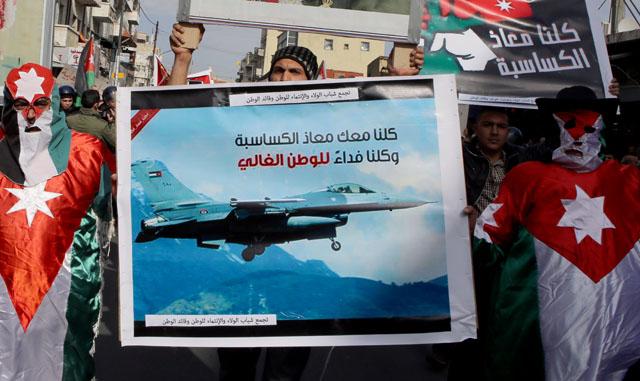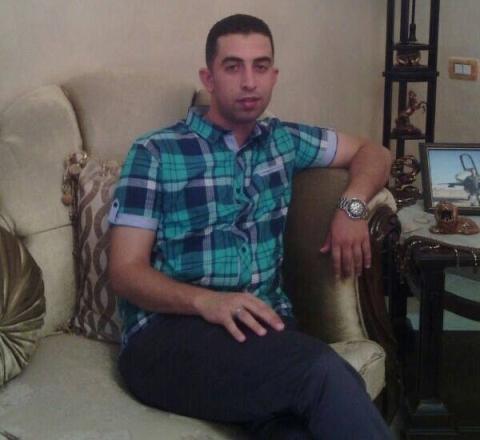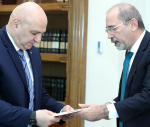You are here
Jordanian F-16 was not downed by IS — army
By Mohammad Ghazal , AFP - Dec 27,2014 - Last updated at Dec 27,2014

AMMAN — The Islamic State (IS) did not down a Jordanian F-16 aircraft in Syria, Jordan and the US confirmed over the weekend.
Meanwhile, reactions to pilot Muath Kasasbeh’s capture continued, with the story grabbing local headlines.
The US and Jordan dismissed claims by the radical group, which said Wednesday it downed the warplane.
The two countries said initial indicators show that the fighter jet, which went down near Syria’s Raqqa, the de facto capital of IS, also known as ISIS, or ISIL, was not downed by the group, which captured its pilot Kasasbeh.
Jordan, along with several Arab and non-Arab states, is part of a US-led coalition fighting IS which is in control of large swathes of Iraq and Syria.
“As it is difficult to reach the wreckage of the fighter jet and as the pilot is not present, it is currently impossible to identify the reason behind the crash of the warplane,” the Jordan Armed Forces-Arab Army said in a statement over the weekend.
“Evidence clearly indicates that ISIL did not down the aircraft as the terrorist organisation is claiming,” the commander of US Central Command, General Lloyd J. Austin III, who is overseeing all coalition military operations in Iraq and Syria, said in a statement posted on the command’s website.
“The Jordanians are highly respected and valued partners and their pilots and crews have performed exceptionally well over the course of this campaign,” Austin said.
“We strongly condemn the actions of ISIL which has taken captive the downed pilot. We will support efforts to ensure his safe recovery, and will not tolerate ISIL’s attempts to misrepresent or exploit this unfortunate aircraft crash for their own purposes,” the commander added.
Agence France-Presse on Friday quoted sources as saying that technical failure prompted the pilot to eject after flying at low altitude.
Kasasbeh “was flying at a high altitude to start with. He hit the brick factory and then disappeared from sight”, said Obada Hussein, a resident from Raqqa who spoke to AFP via Internet.
“Then the plane flew back, and this time smoke was coming out of it. I believe there was a technical failure,” Hussein said.
Another activist from the city, Abu Ibrahim, also spoke of a “technical failure”.
“The plane fell in an area called Hamra Ghannam, in the eastern countryside of Raqqa,” said Abu Ibrahim, who fled IS persecution in Raqqa but continues to be well informed on events there.
The Syrian Observatory for Human Rights gave a similar account.
“Sources in the area saw the plane flying very low. There was a technical failure. The sources then saw IS members fire heavy machineguns and shoulder-fired missiles at the plane,” observatory director, Rami Abdel Rahman, told AFP.
Also over the weekend, the US said it was working closely with the Jordanian government concerning the captured pilot.
Safi Kasasbeh, Muath’s father, called on IS to treat his son as a “guest”.
“I call on them to release my son. He is a military person who obeys orders,” the father said over the phone.
Calls for releasing the pilot continued on social media networks with Her Majesty Queen Rania voicing solidarity with the pilot on her Instagram account.
Christians in Jordan froze festive activities on Christmas in a gesture of sympathy with Kasasbeh and his family.
Related Articles
The United States said Wednesday that it was working closely with the Jordan government concerning pilot Muath Kasasbeh, who was captured by the Islamic State terrorist group in Raqqa, Syria, earlier in the day.
A march was held on Friday in solidarity with captured Jordanian pilot Muath Kasasbeh.
A Royal Jordanian Air Force pilot was captured by the Islamic State (IS) Wednesday after his warplane went down in northeastern Syria, the Jordan Armed Forces-Arab Army (JAF) said in a statement.















